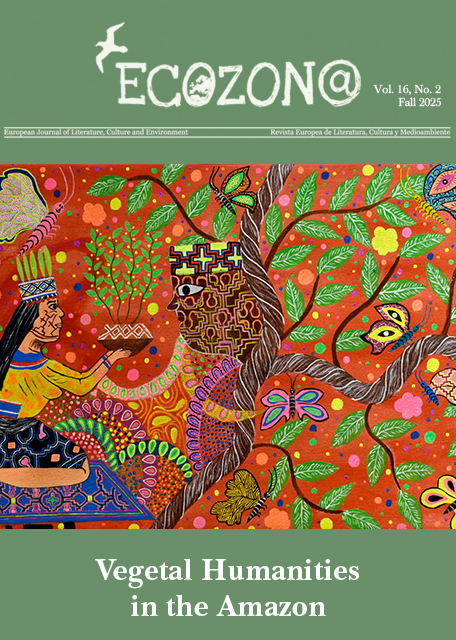The Dirt Witches’ Counter-narrative: A Response to Murray Bail’s "Eucalyptus"
DOI:
https://doi.org/10.37536/ECOZONA.2023.14.1.4872Parole chiave:
critical plant studies, ecofeminism, sustainable counter-narratives, urban forestsAbstract
Murray Bail’s 1998 novel Eucalyptus is an exposition of land ownership, plant classification and human-land relations, using a fairy tale structure. Bail uses parodic excess to deftly undermine settler preoccupations and European traditions that have historically been transposed onto the Australian bush. However, upon a second reading twenty-four years after the first, this author detected an absence of decolonial context in the book, relative to the time of publication, and an unintended reinforcement of misogyny that requires fresh interrogation. This author’s own work as a member of a Dirt Witch collective presents as a dovetailed creative object—an urban forest artwork 2021—and allows a witchy reading of Bail’s 1998 book and more contemporary attempts to redress colonial failures. It also allows an interrogation of the way the novel re-stereotypes Australian women on the land, re-oppresses both land and women and reinforces the very misogyny it was purported to expose.
Downloads
##submission.downloads##
Pubblicato
Fascicolo
Sezione
Licenza
Authors who publish with this journal agree to the following terms:
a) Authors retain copyright and grant the journal right of first publication with the work simultaneously licensed under a Creative Commons Attribution License that allows others to share the work with an acknowledgement of the work's authorship and initial publication in this journal (CC BY-NC for articles and CC BY-NC-ND for creative work, unless author requests otherwise.
b) Authors are able to enter into separate, additional contractual arrangements for the non-exclusive distribution of the journal's published version of the work (e.g., post it to an institutional repository or publish it in a book), with an acknowledgement of its initial publication in this journal.
c) Authors are permitted and encouraged to post their work online (e.g., in institutional repositories or on their website) prior to and during the submission process, as it can lead to productive exchanges, as well as earlier and greater citation of published work (See The Effect of Open Access).










